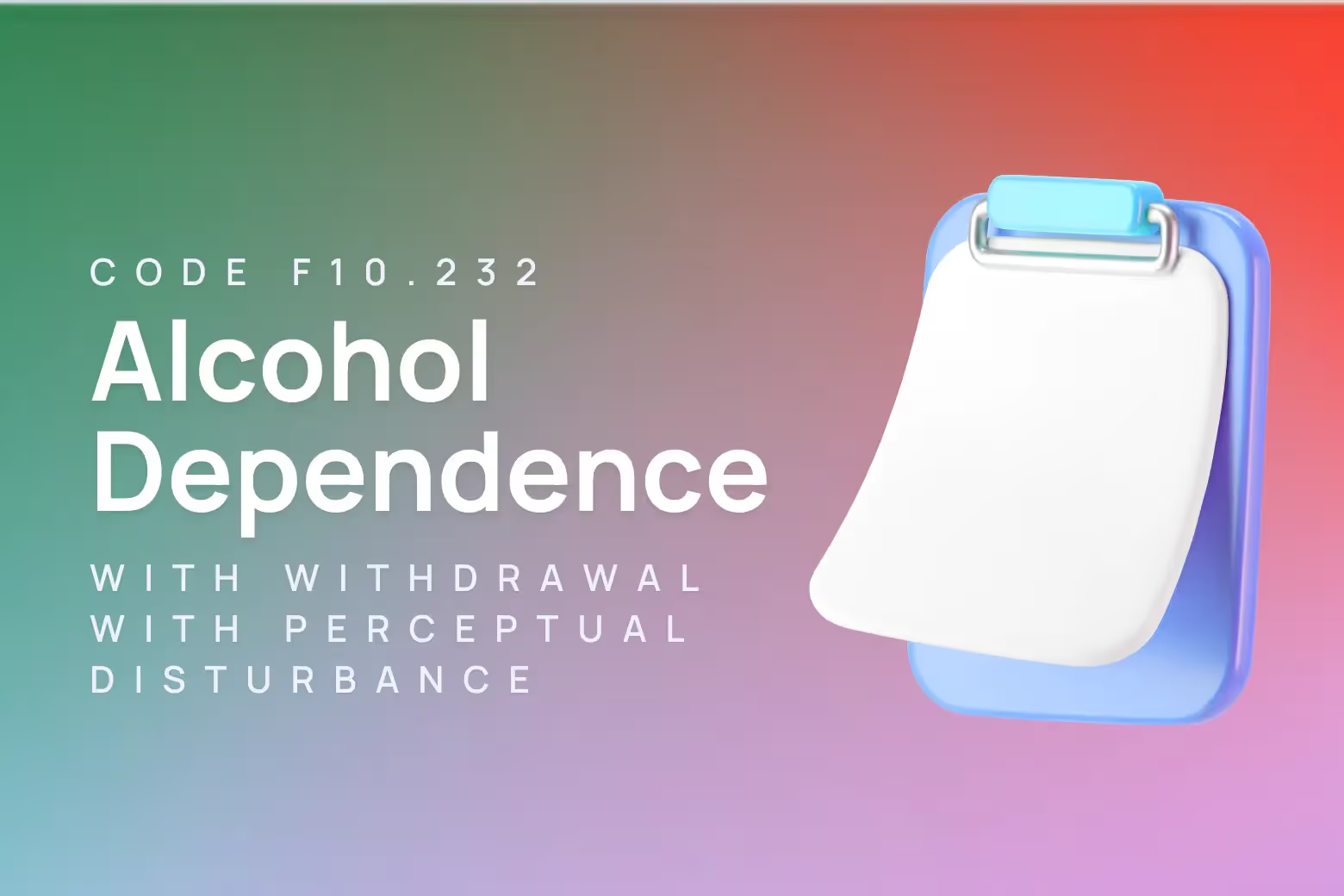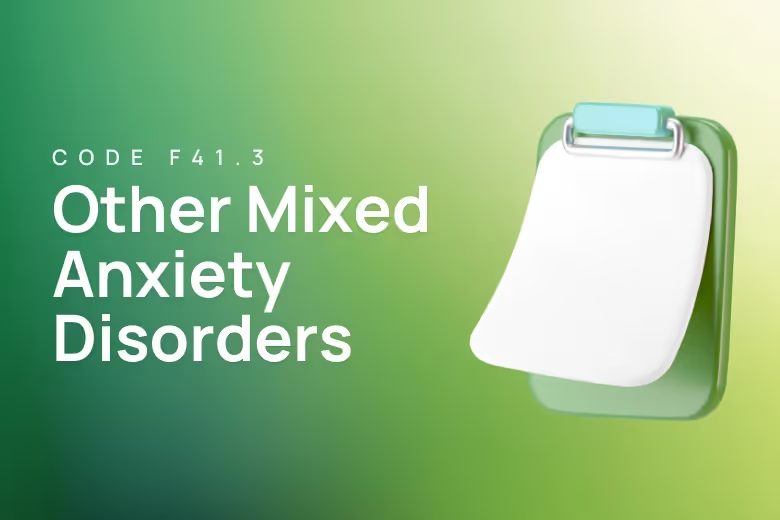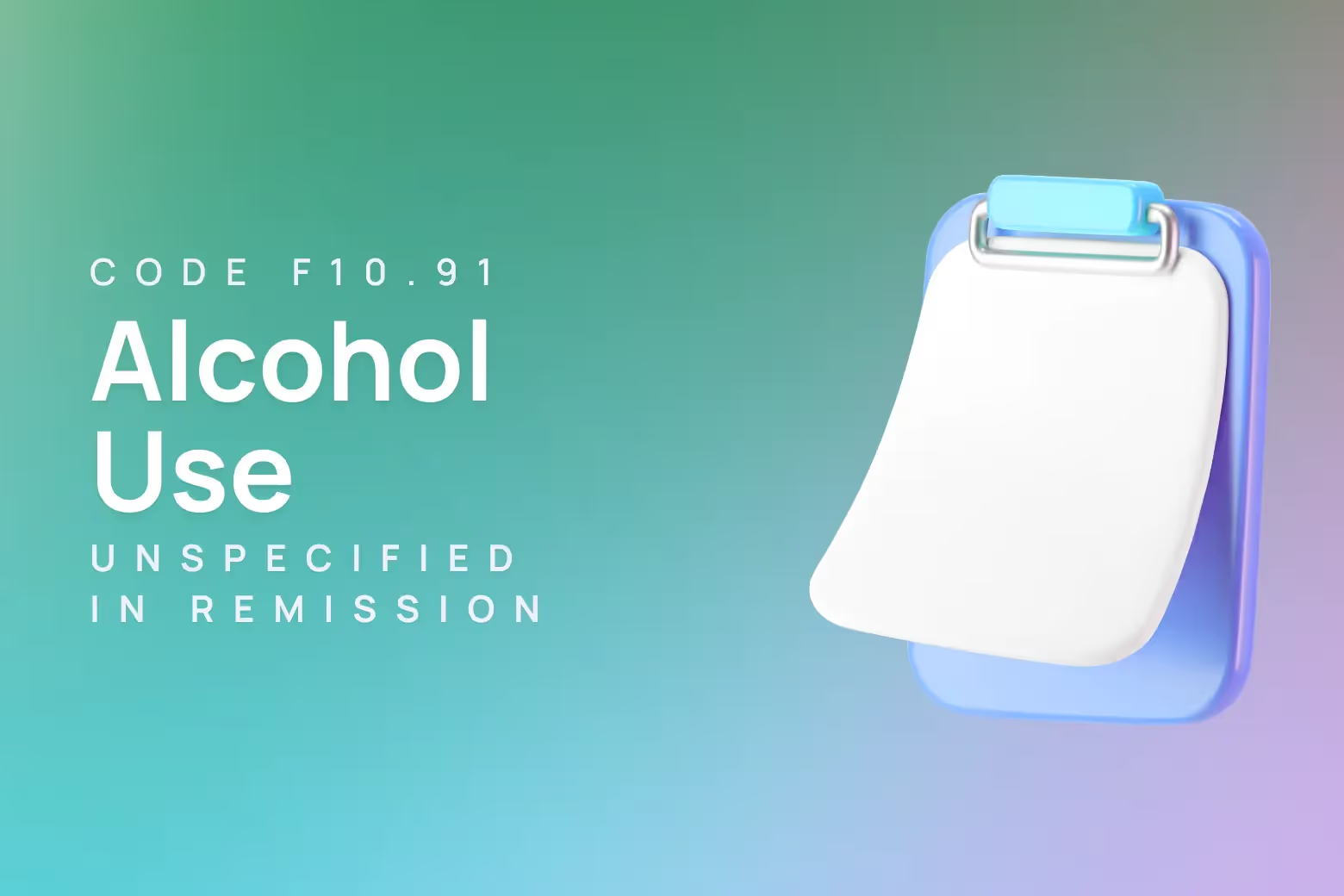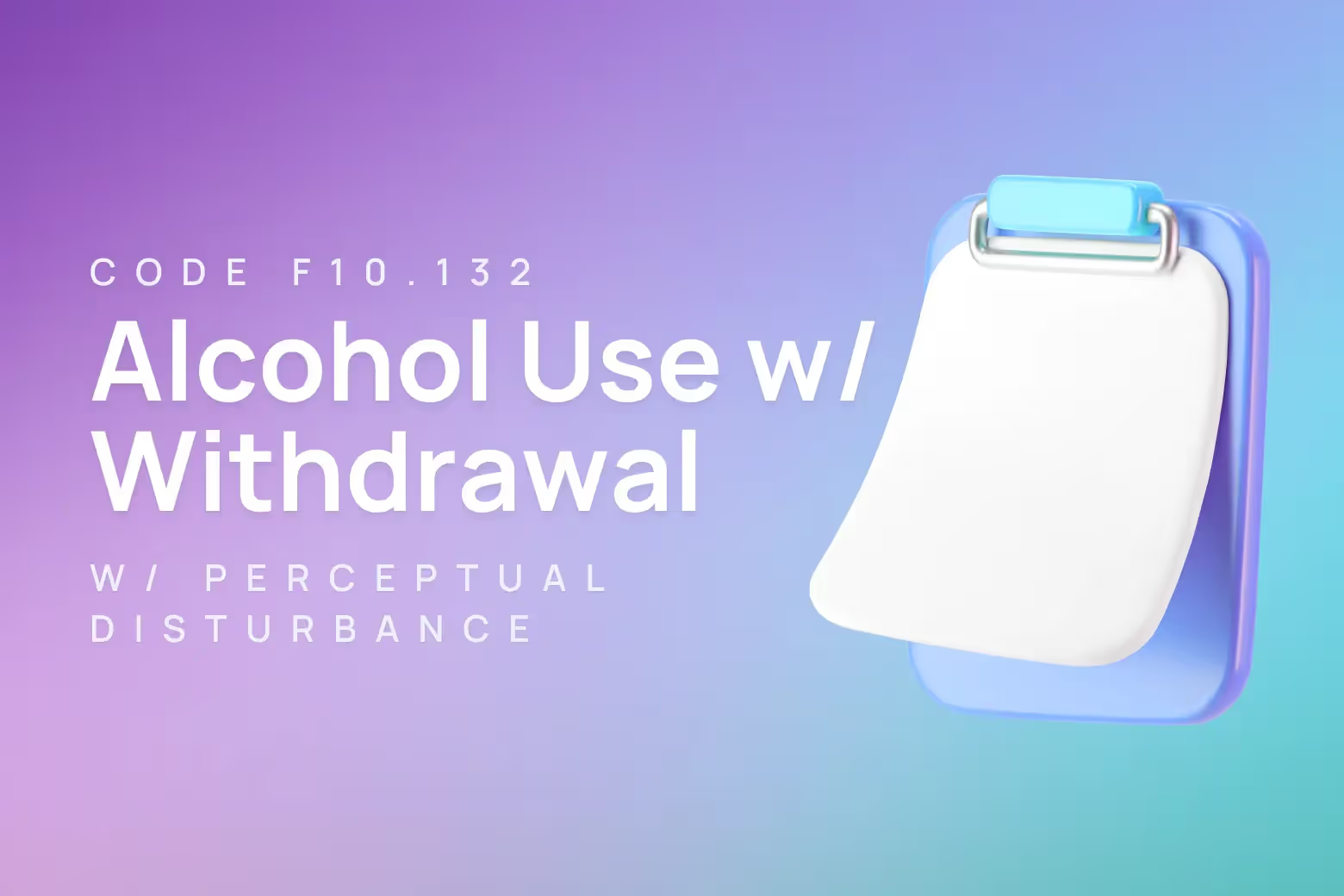ICD-10 code for alcohol dependence with withdrawal, with perceptual disturbance

F10.232 is the ICD-10 code for alcohol dependence with withdrawal, with perceptual disturbance.
This code represents a severe manifestation of alcohol withdrawal syndrome occurring in individuals with established alcohol dependence who experience hallucinations or other perceptual abnormalities during cessation or reduction of alcohol use.
Accurate diagnosis ensures appropriate intervention and reduces the risk of potentially life-threatening complications.
Key features:
- Applies to clients with established alcohol dependence experiencing withdrawal symptoms accompanied by hallucinations or perceptual disturbances
- Perceptual disturbances include visual, auditory, or tactile hallucinations that occur during withdrawal
- Requires immediate medical evaluation and structured withdrawal management
- Distinguished from uncomplicated withdrawal or alcohol withdrawal delirium by specific symptom presentation

Diagnostic criteria for alcohol dependence with withdrawal, with perceptual disturbance (F10.232)
The diagnosis requires evidence of established alcohol dependence combined with characteristic withdrawal symptoms that include perceptual disturbances.
Alcohol dependence involves a cluster of behavioral, cognitive, and physiological phenomena that develop after repeated alcohol use.
Withdrawal symptoms typically emerge within 6 to 24 hours after the last drink, though they can occur even while blood alcohol levels remain elevated in individuals with severe dependence.
The perceptual disturbances that characterize this specific code distinguish it from uncomplicated withdrawal.
Required diagnostic elements include:
- Presence of alcohol dependence: At least two symptoms from the 11-criterion alcohol use disorder framework occurring within a 12-month period, with moderate to severe presentation (4 or more symptoms)
- Withdrawal syndrome features: Physical and psychological symptoms following cessation or reduction of alcohol use
- Perceptual disturbances: Visual, auditory, or tactile hallucinations occurring during the withdrawal phase
- Clear temporal relationship: Symptoms develop following reduction or cessation of prolonged alcohol use
- Functional impairment: The combination of dependence and withdrawal significantly impacts daily functioning
When to use F10.232 diagnosis code
Differential diagnosis becomes critical when evaluating patients presenting with alcohol withdrawal and perceptual symptoms. Several related codes must be carefully distinguished based on symptom presentation and severity.
F10.232 vs F10.230 (Alcohol dependence with withdrawal, uncomplicated)
F10.230 applies when withdrawal symptoms occur without perceptual disturbances. These cases present with typical withdrawal features including tremor, sweating, nausea, anxiety, and sleep disturbances but lack hallucinations or misperceptions.
The presence of any visual, auditory, or tactile hallucinations during withdrawal necessitates the use of F10.232 instead.
F10.232 vs F10.231 (Alcohol dependence with withdrawal, delirium)
F10.231 represents alcohol withdrawal delirium (delirium tremens), characterized by disturbance of consciousness, disorientation, and cognitive impairment in addition to perceptual disturbances.
Unlike F10.232, delirium involves clouded consciousness and significant cognitive dysfunction. Clients with F10.232 maintain clear consciousness despite experiencing hallucinations.
F10.232 vs F10.239 (Alcohol dependence with withdrawal, unspecified)
F10.239 serves as a default code when withdrawal symptoms are present but insufficient documentation exists to specify the presence or absence of complications.
When perceptual disturbances are clearly documented, F10.232 provides more precise diagnostic coding.
Related ICD-10 codes
- F10.23 - Alcohol dependence with withdrawal (parent category)
- F10.230 - Alcohol dependence with withdrawal, uncomplicated
- F10.231 - Alcohol dependence with withdrawal, delirium
- F10.239 - Alcohol dependence with withdrawal, unspecified
- F10.10 - Alcohol use disorder, mild
- F10.20 - Alcohol use disorder, moderate or severe
- F10.129 - Alcohol intoxication with mild use disorder
- F10.229 - Alcohol intoxication with moderate or severe use disorder
Interventions and CPT codes for alcohol dependence with withdrawal, with perceptual disturbance
Treatment for F10.232 requires immediate medical stabilization followed by comprehensive substance use disorder treatment.
The presence of perceptual disturbances elevates the clinical priority and typically requires supervised withdrawal settings.
Medical stabilization and withdrawal management
Benzodiazepines serve as first-line treatment for alcohol withdrawal with perceptual disturbances.
Diazepam remains the preferred medication due to its rapid onset and long duration of action. Loading doses of 60-80 mg or until light sedation is achieved help prevent progression to more severe complications.
Relevant CPT codes:
- 90791 - Psychiatric diagnostic evaluation for comprehensive intake assessment
- 99408/99409 - Structured screening and brief intervention (15-30 minutes/>30 minutes)
- G0396/G0397 - Medicare structured assessment and brief intervention (15-30 minutes/>30 minutes)
Individual psychotherapy approaches
Cognitive-behavioral therapy adapted for substance use disorders addresses the behavioral and cognitive patterns maintaining alcohol dependence.
Motivational interviewing helps resolve ambivalence about change and builds intrinsic motivation for recovery.
Relevant CPT codes:
- 90832 - Individual psychotherapy, 30 minutes (16-37 minutes actual time)
- 90834 - Individual psychotherapy, 45 minutes (38-52 minutes actual time)
- 90837 - Individual psychotherapy, 60 minutes (53+ minutes actual time)
Crisis intervention and emergency services
Clients experiencing perceptual disturbances during withdrawal may require crisis intervention services, particularly if hallucinations create safety concerns or psychological distress.
Relevant CPT codes:
- 90839 - Psychotherapy for crisis, first 60 minutes
- 90840 - Add-on code for crisis psychotherapy, each additional 30 minutes
Group and family interventions
Group therapy provides peer support and skills training for relapse prevention. Family therapy addresses interpersonal dynamics that may contribute to alcohol use patterns and builds family support for recovery.
Relevant CPT codes:
- 90853 - Group psychotherapy for substance use disorder treatment
- 90846/90847 - Family psychotherapy without/with patient present
How Upheal improves F10.232 ICD-10 documentation
Clinical documentation for alcohol withdrawal with perceptual disturbances requires precise attention to symptom timing, severity, and specific perceptual phenomena. Upheal's clinical documentation platform provides several key advantages for managing these complex cases.
Suggesting appropriate ICD-10 codes based on session content
Upheal's AI-powered analysis recognizes clinical patterns associated with alcohol withdrawal and perceptual disturbances.
The platform identifies key terms and symptom clusters that indicate F10.232 rather than related codes, reducing coding errors that could impact treatment planning and reimbursement.
The system tracks temporal relationships between alcohol cessation and symptom onset, helping clinicians document the clear connection required for accurate diagnosis.
When clients describe visual, auditory, or tactile hallucinations in the context of alcohol withdrawal, Upheal flags the specific diagnostic criteria for F10.232.
Maintaining HIPAA-compliant records with proper diagnostic coding
Documentation of perceptual disturbances requires careful attention to clinical details while maintaining client privacy.
Upheal automatically generates comprehensive progress notes that capture essential diagnostic information without compromising confidentiality.
The platform ensures that all documentation meets healthcare record standards while protecting sensitive information about withdrawal symptoms and hallucinations.
This balanced approach supports both clinical care and legal compliance requirements.
Reducing administrative burden so you can focus on client care
Managing clients with alcohol withdrawal and perceptual disturbances demands significant clinical attention.
Upheal automates routine documentation tasks, allowing clinicians to concentrate on immediate safety assessments and therapeutic interventions.
The platform streamlines insurance authorization requests for intensive withdrawal management services.
When clients require supervised detoxification due to perceptual disturbances, Upheal generates the detailed clinical justification needed for approval of higher levels of care.
Supporting clients with alcohol dependence with withdrawal, with perceptual disturbance
Clients diagnosed with F10.232 face serious medical and psychological challenges requiring coordinated care.
The combination of physical dependence and perceptual disturbances creates heightened safety risks and psychological distress that demand immediate clinical attention.
Treatment planning must address both acute withdrawal management and long-term recovery goals.
The presence of hallucinations during withdrawal often creates lasting anxiety about future episodes, making clients more receptive to comprehensive treatment engagement.
Clinicians should normalize these experiences while emphasizing the importance of medically supervised withdrawal in future situations.
Family involvement becomes particularly crucial given the frightening nature of perceptual disturbances.
Educating family members about withdrawal symptoms helps them provide appropriate support and recognize when immediate medical attention is needed.
Building a strong support network reduces the likelihood of unsupervised withdrawal attempts that could result in dangerous complications.
Accurate clinical documentation supports these complex cases by ensuring appropriate treatment authorization and continuity of care.
Upheal's clinical documentation platform helps behavioral healthcare providers maintain comprehensive records while focusing their attention on the critical clinical needs of clients experiencing alcohol withdrawal with perceptual disturbances.













